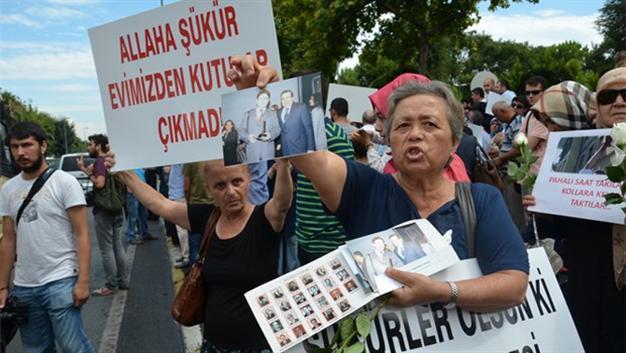20 policemen arrested in ‘parallel state’ probe
ISTANBUL - Anadolu Agency

26 police officers were released earlier amid protests organized by their families
Twenty police officers have been sent to prison after being arrested as part of Turkey’s “parallel state” probe.The arrested officers, including former Istanbul police intelligence chief Ali Fuat Yılmazer, were among 39 others who were detained on charges of illegal wiretapping in an operation launched on July 23. Eight people were released by prosecutors while 11 others were released by the court.
Yılmazer and Erol Demirhan, a former deputy chief of an intelligence branch, were arrested for “launching an organization to commit crimes” and “recording non-public conversations.” Others who were arrested face charges of “recording non-public conversations” and “forging official documents.”
Yılmazer refuted the accusations of organized crime, saying the phone recordings that were collected as part of probes were destroyed after no evidence of a crime was detected.
“It is impossible for me to control each and every document and piece of data as the branch head. I issued a written instruction not to conduct second and third wiretappings if no criminal element was found in the first round. [We] destroyed the recordings that we obtained. I don’t accept the accusations of using the recordings out of purpose. There was never an organized action,” Yılmazer said in his testimony.
Some 26 of 75 officers, who were detained on “espionage” allegations, including Yurt Atayün, former head of the Istanbul police’s anti-terror department, were also released. Some 49 officers were sent to court for with a demand for their arrest. The court has been continuing the questioning of 49 officers in Istanbul.
Sit-in protest in detention
On July 26, police officers who were held in custody even though the legal detention period had been exceeded, staged sit-in protest at Istanbul’s Çağlayan Courthouse. The protest lasted two hours while they were waiting at the court for questioning.
Dozens of senior police officer suspects were detained on grounds of espionage and illegal wiretapping as part of two separate investigations conducted July 22 and 23 in Istanbul and other cities, with Prime Minister Recep Tayyip Erdoğan indicating that the probes would be widened.
The ruling Justice and Development Party (AKP) claims that supporters of Erdoğan’s erstwhile ally, U.S.-based Islamic scholar Fethullah Gülen, formed an alleged “parallel state” aimed at toppling the government, particularly through their posts in the judiciary and the police.
“As far as I remember, Ali Fuat Yılmazer was on the top of this list [of Gülenist police officers]. He [Erdoğan] received it himself and said he would take care of it. But we couldn’t get any result, there was no development,” former Chief of General Staff Gen. İlker Başbuğ said in an interview July 24.
In March, Yılmazer suggested that it was Erdoğan who at the time gave the order to arrest Başbuğ, drawing a fierce denial from the prime minister.
“An immoral, indecent person says, ‘It is the prime minister who demanded this arrest.’ These are lies from A to Z. These people are engaged in deception. How many times did you meet me?” Erdoğan said in an interview March 19.
“He will pay the price for this,” he said, praising the releases at the time of top Ergenekon suspects in the aftermath of a Constitutional Court ruling. He also recalled at the time that he had called in the past for a trial without detention for Başbuğ.
The latest court action follows two high-profile, Istanbul-based anti-graft operations which were launched in December 2013 and led to the arrest of high-profile figures, including the sons of the three government ministers as well as several entrepreneurs. All those detained in the probe were later released pending trial.
The Turkish government has denounced the December probes as a “dirty plot” constructed by a “parallel structure” group of civil servants embedded within the country’s key institutions, including the judiciary and police.
















